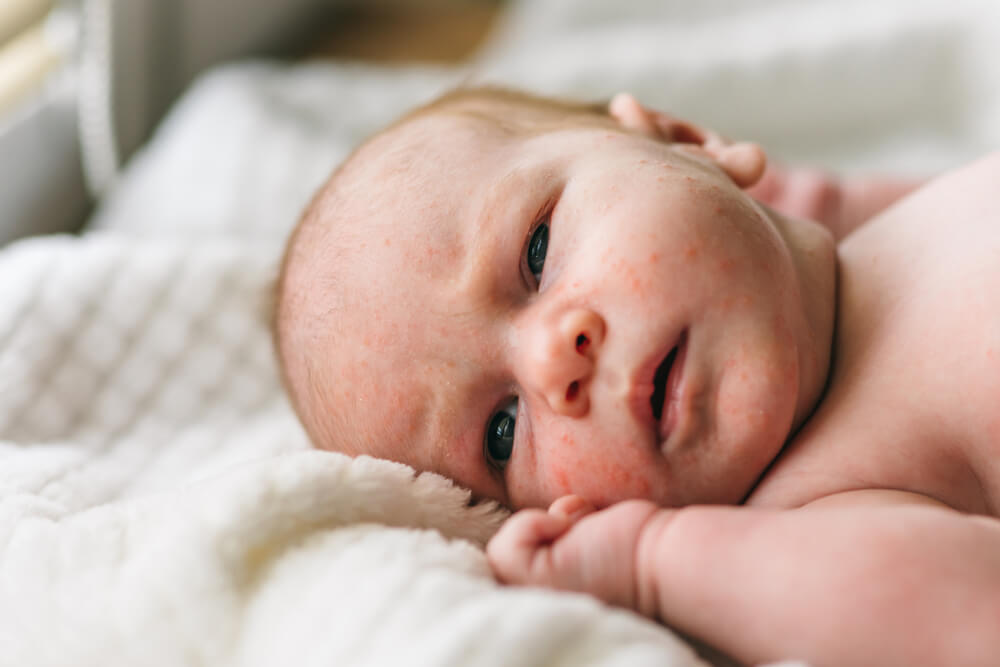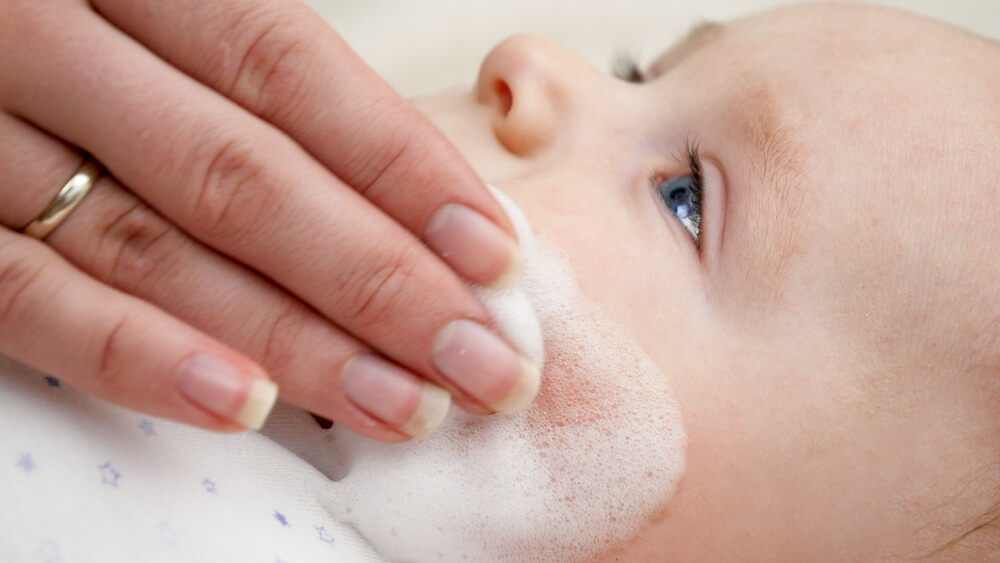Newborns can also suffer from acne, which typically affects the baby’s neck and face. The issue of baby acne is nothing dangerous or rare; in fact, a lot of children deal with infant acne that usually goes away on its own with no visible scars or spots left. If you’re worried about acne on your baby’s face or generally wish to secure the best health services for your young child, you can always count on general pediatric care in Plantation and Doral. It’s our goal at Worldwide Pediatrics to ensure the happiness and well-being of both our young patients and their caregivers.
What Is Baby Acne?
Newborn acne, sometimes called neonatal or infant acne, can appear anywhere on the face or body but typically stays on the face and neck. Little bumps appear on the skin, either red or white. Even if this kind of acne is left untreated, it will still clear up in almost all cases. About 20% of infants are affected by this.
In contrast to infantile acne, which frequently features open comedones like blackheads, baby acne is typically characterized by a less severe form of the condition. Cystic or nodular forms of infantile acne are also possible. Scarring can sometimes occur even if the condition is treated.
As the name suggests, newborn acne occurs only in the first couple of months of the newborn’s life. On the other hand, even after two years of age, infantile acne might persist. Unlike baby acne, infantile acne is quite rare.
The exact cause of neonatal acne is unknown. Researchers have speculated that hormones produced by the mother or the newborn may be to blame.

Potential Symptoms of Newborn Acne
Acne on a baby’s face, like that in teenagers and adults, typically manifests as red pimples or bumps. The skin around the bumps may get red, and white pustules called whiteheads may emerge.
Even infants are susceptible to developing acne, and while it most commonly appears on the cheeks, it can appear elsewhere on the face. It’s also possible to get acne on the neck and/or upper back.
If your infant is fussy or crying, acne may worsen. Acne can be aggravated by wearing rough clothing or by remaining vomit or saliva on the face.
Sometimes, infants are born with acne. However, the condition often appears between two and four weeks following birth. Additionally, the duration of the condition might range from a few days to a few weeks, with some cases even extending into a couple of months.
Other Conditions Similar to Infant Acne
Eczema, milia, and erythema toxicum are all skin disorders that share similar symptoms to neonatal acne.
Eczema
Red, bumpy patches on the face are common symptoms of eczema. As your child grows, it can also show up on their knees and elbows. Yellow and crusty skin is a sign of infection in eczema. When your infant first begins to crawl, they are more likely to scrape their knees and elbows, which can make the condition much more uncomfortable. Doctors can typically tell apart acne in infants from eczema fairly easily. Eczema comes in many forms, but atopic dermatitis is the most common.
Commonly mistaken for acne, seborrheic eczema is also a skin disorder that affects infants more frequently. You might know it as seborrheic dermatitis or crib/cradle cap.
Topical ointments like Vanicream and Aquaphor are available without a prescription and can be used to treat eczema. The doctor could also recommend a mild medicine. Baby probiotics and avoiding foods your child is allergic to may also be suggested.
Milia
Milia are the small white pimples that may appear on the newborn’s face. Dead skin cells become trapped in microscopic pockets of skin, and this can cause them to emerge as early as a few weeks after birth. Milia is not the same thing as baby acne, so there’s no need to treat the condition.
Erythema Toxicum
Another common skin ailment is erythema toxicum, which can manifest as a rash, small pimples, or red blotches. In the first couple of days after birth, it may appear on your baby’s face, limbs, or chest. It’s completely safe and goes away on its own after a week or less.
Baby Acne Treatment Options

Infant acne normally clears up on its own. However, acne on a baby’s face can sometimes last for months. Your baby’s pediatrician may recommend a medicated cream in this case.
No over-the-counter creams, washes, or other remedies for acne should be used. The skin of your newborn is exceptionally delicate. If you use something that is too aggressive, you risk making the acne even worse or causing further irritation to the skin.
There are certain things you can do at home to maintain your baby’s skin healthy while you wait for the acne to clear up:
- Use warm water to wash your baby’s face every day. Just water is enough, but you can also use a soap-free cleanser or very mild soap.
- Avoid using chemical-laden bath products and scented soaps. Don’t use anything for treating adult acne, either.
- Your baby’s skin may become more irritated by lotions and creams, making the acne worse.
- Towel scrubbing aggravates the skin even more. Make soft, circular movements with a wet washcloth instead.
- Don’t touch or squeeze the acne. Your infant’s skin will become more inflamed as a result of this.
- Your infant will not experience any itching or discomfort from baby acne, so remain patient, as the condition will typically pass quickly.
There is currently no specific therapy for infant acne, but if you are concerned, you should see a pediatrician. Asking questions about infant acne and addressing any other health issues you may have can be done during a checkup.
Get medical help as soon as possible if your infant develops blackheads, pustules, or irritation as a result of acne. If they are experiencing any pain or discomfort, you should see a doctor immediately.
While it is true that infant acne does not tend to return, it is essential to remember that if your kid experiences acne again before adolescence, it may be an indication of a more serious medical issue and warrant a visit to the doctor.
As mentioned, baby acne is a relatively common condition that can show up after birth in some infants, and it’s nothing too dangerous. The issue is believed to be caused by certain hormonal production, be it by the mother or the baby, but the exact cause is still unknown. Even so, baby acne is harmless and tends to go away relatively quickly, even with no treatment. Of course, if there’s anything about infant acne that worries you, don’t hesitate to ask your pediatrician about it. During this time, you’ll probably have already scheduled checkup appointments, so make sure to bring up anything that concerns you. You can always count on us at Worldwide Pediatrics to support the children and their parents with trusted and expert care.



